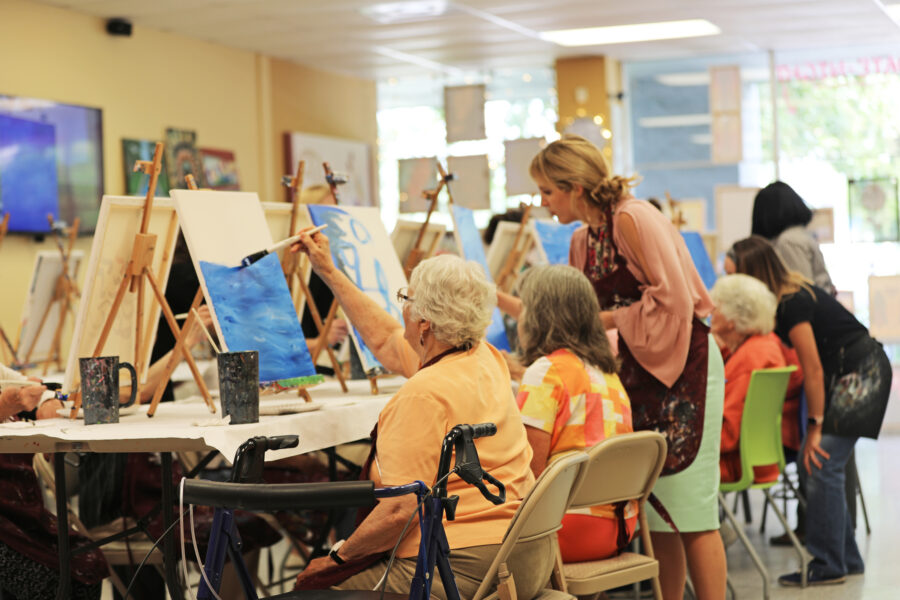Thank you SEIU for sponsoring this post.
I think we can agree that home care workers are essential, frontline healthcare workers who provide the skilled, compassionate, dedicated care of seniors and people with disabilities. Millions of people rely on home care workers to live safely and independently at home. That’s the goal for everyone, right? To live and die in their home.
I’ve worked in an assisted living and memory care community for the last six years. The majority of the time, people come to me after they have had home care workers in their home, helping them with everyday tasks such as cooking, cleaning, showering, grocery shopping, toileting, you name it.

I bet you know someone who has had or currently has a home care worker assisting a loved one in his or her home. But did you know that nearly 90 percent of home care workers are women? And more than 60 percent are people of color, 31 percent being immigrants. Source

Home care jobs are some of the most important yet thankless and underpaid jobs in our communities. Home care workers make it so people in need of long-term care can stay in their homes, stay out of nursing homes, and be surrounded by the people and things they know and love. It is crucial that home care workers are respected, protected, and paid for the incredible, selfless work they do. Finding someone to assist with caregiving and ease the demands for your family can be challenging. Families often ask themselves, “how can I be sure my loved one will be well cared for?” Why wouldn’t they compensate those doing such an undesirable yet crucial and impactful job?

Despite being one of the fastest-growing, most in-demand professions, home care jobs are some of the lowest paid in the country. Ready for this? Nationally, the median hourly wage for home care workers is just $12.12, and the median annual wage is just $17,200. Source: This is unacceptable. Just like those caring for your children, individuals caring for your aging or disabled loved ones deserve higher pay and protection. The false narrative that caregiving is just “unskilled women’s work” is shameful. Caregiving takes patience, empathy, strength, and adaptability.

I know I mentioned that caregiving is thankless. But I mean, most of the time, it is truly unacknowledged. The person you are caring for may not even be able to understand everything you are doing for them. They may have cognitive impairment and get upset with you. But as the caregiver, you know that the quality of their life depends on you. Caregivers may feel overwhelmed. Caregivers are faced with difficult decisions. They may experience resentment. Yet they come back every day to care for your loved one for very low pay.

Often, people will mistakenly believe being a caregiver to an elderly or disabled adult is like having another child. As someone who has two small children and works with seniors as my day job, this could not be further from the truth. An adult has already formed opinions and their own routines. Seniors need medications managed. They need transportation to various medical appointments. They need help in the shower and using the bathroom.

At some point in our lives, we will all need some form of long-term care. That’s why my job as the area sales director of a few assisted living is so busy. People are getting older, living with a disability, or recovering from an illness or injury. Most seniors that come in to tour my community do not want to leave the home where they raised their children. Their home is full of memories. Their home is so familiar and comfortable.
Today in the United States alone, nearly 20 million adults require assistance with their activities of daily living due to physical, cognitive, developmental, and/or behavioral conditions. From 2018-2028, the U.S. will need to fill over 4.4 million home care job openings. Source and source How will these essential jobs be without proper respect and higher pay?

I’ve spent days, hours, and years with some incredible caregivers. Even at our painting class (as pictured), my seniors needed assistance with transportation, toileting, medication management, reminders to drink water while there, and reassurance it was safe. But it was so rewarding.
Caregiving is the foundation of the American economy and makes all other work possible. Something I usually tell family members who are presently the primary caregiver for their loved ones is “You are doing everything right because you are doing everything you can.” Visit CareIsEssential.org to learn more about home care workers — who they are, what they do, and why they are fighting for the respect, protection, and pay they deserve. Click here to show your support for home care workers.
The Service Employees International Union (SEIU) unites 2 million diverse members in the United States, Canada, and Puerto Rico. SEIU members working in the healthcare industry, in the public sector, and in property services believe in the power of joining together on the job to win higher wages and benefits and to create better communities while fighting for a more just society and an economy that works for all of us, not just corporations and the wealthy.
The 740,000+ home care workers united in SEIU are raising awareness of the rising demand for affordable long-term care. This movement of caregivers is calling on lawmakers at all levels to present policy solutions so seniors and people with disabilities have quality, affordable home care and all the nation’s 2.4 million home care workers have good union jobs. www.seiu.org | www.CareIsEssential.org
If you liked this post, you would love Paying for Senior Living: What Your Need to Know
